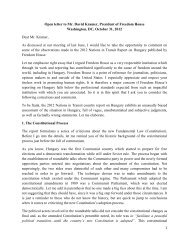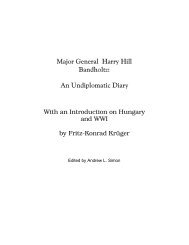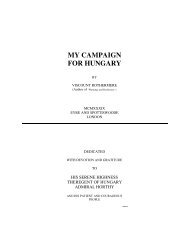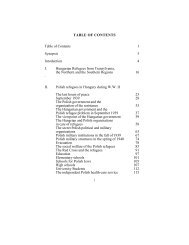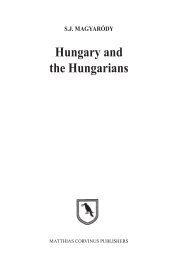The Fate of Western Hungary 1918-1921 - Corvinus Library ...
The Fate of Western Hungary 1918-1921 - Corvinus Library ...
The Fate of Western Hungary 1918-1921 - Corvinus Library ...
Create successful ePaper yourself
Turn your PDF publications into a flip-book with our unique Google optimized e-Paper software.
<strong>The</strong> tacit support by the Austrian government for western Hungarian<br />
secessionist aspirations and the <strong>of</strong>ficially declared claims <strong>of</strong> the Vienna<br />
government for the territory <strong>of</strong> <strong>Western</strong> <strong>Hungary</strong> significantly contributed to<br />
the December 3 semi-<strong>of</strong>ficial announcement <strong>of</strong> the Károlyi government: it<br />
supported the autonomy petition expressed by the Germans <strong>of</strong> <strong>Hungary</strong>. <strong>The</strong><br />
idea <strong>of</strong> self-government found support primarily in the city <strong>of</strong> Sopron and its<br />
surroundings. A German National Council was organized in the city by Géza<br />
Zsombor, which claimed the right to represent the interests <strong>of</strong> all the Germans<br />
in <strong>Western</strong> <strong>Hungary</strong>. Géza Zsombor published a 70 page German-language<br />
pamphlet in the second half <strong>of</strong> the following year (Sopron, Corvina publishing)<br />
titled <strong>Western</strong>-<strong>Hungary</strong>. With <strong>Hungary</strong> or Austria? 57 <strong>The</strong> question, or territorial<br />
affiliation, would drag on until the end <strong>of</strong> <strong>1921</strong>.<br />
Initially, the German National Council only asked for ending the mandatory<br />
use <strong>of</strong> the Hungarian language in public administration and educational matters.<br />
However, shortly after, it proposed to the government the creation <strong>of</strong> a German<br />
autonomous region. Following this, adherents <strong>of</strong> autonomy held meeting after<br />
meeting until the representatives <strong>of</strong> the German-speaking population <strong>of</strong><br />
Pozsony, Moson, Sopron and Vas counties formed, in Sopron on December 23,<br />
<strong>1918</strong>, the <strong>Western</strong>-<strong>Hungary</strong> German People’s Council (Deutscher Volksrat für<br />
Westungarn), which declared the autonomy <strong>of</strong> <strong>Western</strong> <strong>Hungary</strong>. 58 It is<br />
important to note that the emerging German national movement <strong>of</strong> <strong>Hungary</strong><br />
wanted to remain within the borders <strong>of</strong> the country and did not wish to secede<br />
from <strong>Hungary</strong>, as opposed to the Slovaks, Romanians, Croatians, Vends<br />
(Slovenians) and Serbs. Two directions emerged: one, led by Jacob Bleyer<br />
(1874-1933), literary historian, linguist and politician, and two, led by Rudolph<br />
Brandsch. <strong>The</strong> difference between the two views consisted <strong>of</strong> the measure <strong>of</strong><br />
minority rights Germans living in various parts <strong>of</strong> <strong>Hungary</strong> were to enjoy. <strong>The</strong><br />
chief supporters <strong>of</strong> the creation <strong>of</strong> the self-administered municipality were those<br />
who did not want to join Austria. Among them were the sizeable strata <strong>of</strong><br />
manufacturer and commercial middle class, possessing various amounts <strong>of</strong><br />
influence, who would be shorn <strong>of</strong> their customers and markets. A sector <strong>of</strong> the<br />
press trumpeted in its articles that mainly Hungarian populated towns and<br />
county seats within the autonomous region would slowly become Germanized.<br />
At the turn <strong>of</strong> <strong>1918</strong>-1919, the influencing <strong>of</strong> public opinion was in full swing in<br />
<strong>Western</strong> <strong>Hungary</strong>, the campaign to popularize Austria. <strong>The</strong> chief magistrates <strong>of</strong><br />
the districts directed the notaries working in the villages to try their utmost and<br />
prevent the agitation among the populace for the secession <strong>of</strong> the territory.<br />
It was not by accident that at the same time, the regular visits to the German<br />
304. Also, Soós, Katalin, G.: Magyar–bajor–osztrák titkos tárgyalások és<br />
együttműködés 1920–<strong>1921</strong> [Hungarian-Bavarian-Austrian secret talks and<br />
collaboration]. In: Acta Historica, vol. XXVII. Szeged, 1967, pp. 3–43.<br />
57 Zsombor, Géza: Westungarn. Zu Ungarn oder zu Oesterreich [<strong>Western</strong> <strong>Hungary</strong>. In<br />
<strong>Hungary</strong> or Austria]? Corvina Verlag, Oedenburg [Sopron], 1919.<br />
58 Kővágó, László: A Magyarországi Tanácsköztársaság és a nemzeti kérdés [<strong>The</strong><br />
Hungarian Soviet Republic and the national question]. Budapest, 1989, p. 78.<br />
29




